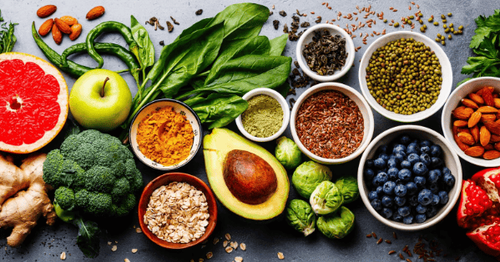This is an automatically translated article.
The article was professionally consulted by Specialist Doctor I Bui Thi Ha - Pediatrician - Neonatologist, Department of Pediatrics - Neonatology - Vinmec Ha Long International HospitalWeaning is the first step in life to help children develop comprehensively and perfect their ability to eat later. However, families with children for the first time are still confused about when to introduce solid foods, what is the best weaning menu, what foods children can eat, what foods children cannot eat... To help parents have the most accurate overview of weaning, the following article will provide a complete guide to weaning as recommended by the National Institute of Nutrition.
1. What is weaning?
To feed the baby properly, we must first understand what weaning is? Weaning means feeding the baby with foods other than breast milk, including starch, vitamins from vegetables, meat, fish, eggs, fruit, milk... These foods only work. Supplementing nutrients to help children develop comprehensively, not to replace breast milk. Breast milk provides many antibacterial factors to help babies increase resistance, reduce the risk of disease. Therefore, mothers still need to breastfeed their babies fully, reduce the amount of milk and gradually increase the amount of food according to the age of the children.2. Time to start feeding your baby solids
The National Institute of Nutrition recommends that after 6 months is the best time for babies to start solids. Because from the age of 6 months onwards, the baby grows strongly, the high growth rate means that the nutritional needs also increase. At that time, breast milk was not enough to meet the nutritional needs of the baby, especially after 6 months, breast milk began to dilute and gradually decreased. Therefore, children need to be supplemented with nutrients by eating solids to be able to grow well and be healthy.
6 tháng tuổi là thời gian phù hợp bắt đầu cho trẻ ăn dặm
3. Harm of giving baby solid foods too early or too late
Many parents give their baby solid foods too early, even from the time the baby is 3-4 months old, this has many potential risks affecting the health of the child such as:Risk of affecting the digestive system due to the Children's digestive system is still immature, not yet adapted to some foods. Food is not guaranteed, difficult to digest, causing diarrhea and constipation in children. Babies eat solids early, which makes them less likely to breastfeed, and the nutrients in breast milk are deficient in children, especially those that help increase resistance. If the baby is given solid foods too late (after 9 months), it will cause the baby to lack nutrients necessary for growth, leading to the risk of malnutrition. , rickets, anemia...
4. Principles for proper feeding of babies
Feed your baby from a little to a lot of weaning At the beginning of weaning, parents should practice feeding the baby little by little. The first 1-3 meals can give the child 5 - 10ml of food. Increase the amount of food gradually so that the baby's stomach and digestive system have time to get used to and adapt to a new food other than breast milk.Give the child solid food 1 meal/day. When children get used to it, they can increase to 2 meals/day and add snacks such as fruit, yogurt, whey...
Give baby solid to liquid solids that gradually increases the density. Gradually increase the coarseness, from flour to sifted porridge, whole grain porridge, crushed rice... so that children can quickly eat foods like adults.
Give the child foods that are soft, easy to chew and easy to swallow because at this time the child has not yet teethed or has very few teeth.
Prepare nutritious and hygienic baby food. At first, children should only eat easily digestible foods such as porridge and vegetables, tubers and fruits. However, from 9 to 11 months, children need to eat all 4 food groups including: rice; meat, eggs; fish, shrimp, crab; vegetables, tubers and oil or fat... In addition, children should eat a lot of fruit to supplement the vitamins necessary for the body, help children grow faster, develop healthier.

Cho trẻ ăn dặm đầy đủ dinh dưỡng từ ngũ cốc, rau củ quả, thịt cá, dầu mỡ
5. Weaning menu suitable for age
Weaning menu for children from 6 to 12 months Children from 6 to 8 months old: At this stage, children are learning to eat, so they should eat soft and easy-to-digest foods. The child's digestive system is also getting used to food, so let the child eat little by little, each week increase the amount of food a little bit. You should first eat 1 meal/day, then increase to 2 meals/day, and at the same time increase the consistency of the porridge.Note: it is necessary to feed the baby a lot, balance the amount of food just right so that the child is not too full and stops nursing. From the 7th month onwards, children can eat more fruits to supplement vitamins and minerals such as avocado, papaya, banana, persimmon, mango... Children from 9-11 months: This stage can Give your child 3-4 meals of solid powder a day. In addition to vegetables, children should eat more eggs, meat, fish, seafood and especially oil or fat. Continue to breastfeed or formula feed your baby every day.
Weaning menu for children from 12 to 23 months When children are 1 year old, they can eat a variety of foods and eat 4 meals a day. In a meal, children need to eat enough starch; eggs or meat, fish; vegetables and fats.
Weaning menu for children from 24 - 36 months This stage children can eat rice with foods like adults. However, it is necessary to avoid foods that are too hard and chewy, foods that are likely to cause choking or choking.
From the age of 2 onwards, many children are no longer breastfed. Therefore, meals need to be supplemented with adequate nutrients to ensure the development of children. In addition to 3-4 main meals per day, children can eat 1-2 extra meals.
Let children eat together with the whole family so that children learn to eat, pick up food and chew food thoroughly.
Note: no matter what age you are, you should not give your child a lot of junk food such as cake, candy, chips, chips... because it will make your child full and skip meals.
6. Common mistakes when feeding baby solids
According to the National Institute of Nutrition, under 1 year old, children's kidneys are still weak, can not load more than 1g of salt per day. Do not add salty spices to your baby's food. The food itself provides enough of the child's needs. From 1 year old and up, you can add a little salt or fish sauce, pay attention to light seasoning. It is best to train children to eat light foods from a young age to ensure their health later on. For children to eat sweet porridge: Parents should not use too much sugar for children. For adults, the maximum amount of sugar consumed in a day is 20g. Therefore, children should not eat too much sugar will affect their health. Only give children porridge with gravy: It is recommended to change protein-rich foods regularly, chop fish meat into porridge to make children's meals more diverse and strange. Do not use fat when cooking baby food: Children need to be supplemented with fat from fat in a sufficient amount for the body to absorb maximum nutrients. You can use vegetable oils specifically for children such as: walnut oil, canola oil... Feeding children rice too early without teeth: Swallowing rice will cause the child's stomach to work too hard. . During the baby's weaning, parents should supplement their children with supporting products containing lysine, essential micro-minerals and vitamins such as zinc, chromium, selenium, and B vitamins to help fully meet their nutritional needs. substances in children. At the same time, these essential vitamins also support digestion, enhance nutrient absorption, help improve anorexia, and help children eat well. Parents can simultaneously apply dietary supplements and functional foods derived from nature for easy absorption. Please accompany your child throughout the development process and regularly visit the website vimec.com to update useful baby care information.














